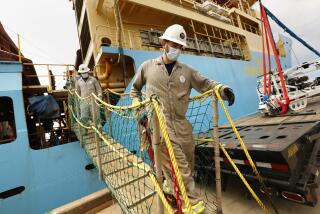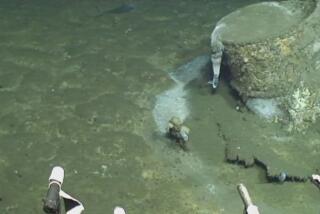More Scientists Supporting New Look at ‘Ocean Option’ for Radioactive Waste
- Share via
PACIFIC GROVE, Calif. — Almost four years after a global moratorium on ocean dumping of low-level radioactive waste, increasing numbers of scientists are calling for a re-evaluation of the ban.
That was apparent Friday at the conclusion of a five-day symposium on ocean disposal attended by 130 scientists from nine countries. Many of the scientists here warned that land disposal poses a far greater threat to human health and the environment than ocean dumping.
“In terms of scientific consensus, I have never been aware of any time that most scientists didn’t think the ocean should be considered equally (with land as a dumping site). . . and let the chips fall where they may,” said Andrew Robertson, chief of the ocean assessment division for the U.S. National Oceanic and Atmospheric Administration.
The renewed public discussion among scientists of the “ocean option” comes at a time when states are struggling to meet a congressional deadline of January, 1987, for establishing regional compacts for the land disposal of low-level radioactive wastes.
Currently, low-level wastes, which include radioactive materials used in medicine and industry, are buried in shallow pits in Beatty, Nev., Richland, Wash., and Barnwell, S.C. California produces 220,000 cubic feet of low-level waste annually, which is sent to Richland.
But, even as many scientists called for the “ocean option,” they acknowledged that the political tide is running against them.
“I’m discouraged,” said Charles L. Osterberg, an ocean resources specialist with the U.S. Department of Energy who has worked with renowned oceanographer Jacques Cousteau and who has challenged Cousteau’s warnings that the world’s oceans are “dying” from pollution.
“I think all the environmental groups are in favor of strong laws protecting the ocean, and I think probably 99% of the public is, too. And, in a democracy that pretty much does it. I just think they’re wrong,” Osterberg said in an interview.
He argued that the ocean, with 323 million cubic miles of salt water, is better able to cleanse itself than the land. The ocean also produces just a fraction of the world’s food. By contrast, he said, land disposal would not only threaten the food chain but contaminate drinking water and threaten humans by direct exposure.
Such arguments, he complained, are often ignored by those intent on saving the oceans.
“We’d have a heck of a lot more respect for ground water if we had whales in it,” Osterberg said.
Not all scientists are in agreement that ocean dumping is necessarily preferable.
David Goldsmith of the toxic substances research and teaching program at the University of California, Davis, observed: “We’re not prepared at the moment to do effective policy-making because we don’t have good science at the moment.”
Whatever is learned in those studies, several said it would be unrealistic to base policy decisions purely on scientific evidence.
Fears of Contamination
Clifton E. Curtis, president of the Washington-based Oceanic Society who addressed the symposium Friday, noted that fishermen in Spain and Ireland in the past several years have seen the markets for their catch drop because of unsubstantiated fears of radioactive contamination.
Those fears prompted Spain to become one of the principal proponents of the moratorium, which began in the summer of 1982.





